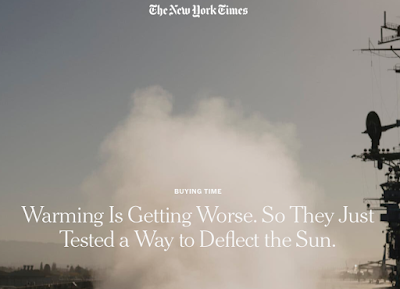If your child is deathly allergic to insect stings, what do you do? You buy an EpiPen® (or two or three) and keep it near your child at all times. An epinephrine auto-injector could save your child's life one day if a bee sting or wasp sting leads to anaphylactic shock.
Now, let's apply this as a metaphor. Your child (or your wife, in the case I witnessed) is stung on the neck by a wasp. You always carry an EpiPen, just in case. Well, this is the "case" you've been waiting for, but instead you decide to wait and see. Why use an EpiPen if you don't have to, right? I mean, heck, nobody wants to be given a medication they don't need. Right? And why waste the money?
Fast forward about 30 minutes. You carry your child (or your wife, in the case I witnessed) into the emergency ward. They're almost dead, but the doctor works feverishly, injecting this and that, setting up a drip, calling the helicopter ambulance, staying with your child (or wife) to monitor their condition until the moment the helicopter ambulance closes its door. Just before that door closes, eyelids flutter and open slightly, and a very weak voice says, "I was almost gone there, wasn't I?" Your child (or your wife, in this case) lives.
The doctor is shaken for weeks. He knows how close he came to losing your child (or your spouse). He's just happy he didn't have to perform a tracheotomy but keeps asking the same question, over and over. Why, if they had an EpiPen, did they not use it? (My husband was the doctor, I was his assistant. This incident took place many years ago. As you can tell, I am still shaken by this memory.)

(You think I'm being overly dramatic, perhaps for effect? No. Once we allow the summer Arctic sea ice to disappear, the northern hemisphere will lose the cooling "air conditioner" effect during our growing season. Remember Russia, 2010? It won't take too many widespread crop failures before we descend into global chaos.)
How many people deal with their bee sting allergy by just living life indoors all the time? Not many. Most choose to go outdoors — and carry an EpiPen. We've been carrying a metaphorical EpiPen around since at least 1988: the concept of living the same lifestyle but lowering our global greenhouse gas emissions, moving to renewable energy, being greener.
Now we've been stung, and we refuse to use our EpiPen. It's too expensive, we say. We can't afford it. It's too inconvenient. "I'd rather die comfortable than live uncomfortable." (Real quote, that one.) I'm not going to use my EpiPen unless China uses its Epipen! Blah blah blah.
So what are we going to do? It's an emergency situation! What are we going to do? We're actually facing down the prospect of extinction of our species! What are we going to do?
Folks, the tracheotomy is an emergency procedure for emergency situations. Our collective tracheotomy is geoengineering: "deliberate large-scale engineering and manipulation of the planetary environment to combat or counteract anthropogenic changes in atmospheric chemistry" (Wikipedia).
If we're already saying no to the possibility of geoengineering, then we either don't realize the emergency we're in, or we're choosing a future with no future for our children. The Canadian Youth Climate Coalition naively, in my view, calls geoengineering "a false solution."
Friends, geoengineering is not a false solution, it is our last resort — and soon to be our only solution. We have been stung. We are ignoring the allergic reaction. We are refusing to use our EpiPen. If we don't get some adrenalin into our system soon, we'd better be open to a tracheotomy (pardon the pun). Because otherwise, we are opting for death.

While the deniers have been denying that digging up and burning carbon that was safely stored away via the long-term carbon cycle 250 million years ago — and spewing an extra ±50 billion tonnes of CO2 and other greenhouse gases into the atmosphere every year — would affect the climate system or overwhelm the short-term carbon cycle, conspiracy theorists have been insisting that some secret cabal has been geoengineering the climate. (To be fair, the geoengineering began at the start of the Industrial Revolution back around 1750 when we industrialized our fossil fuel burning. (And our impacts began 11,000 years ago as we started developing agriculture.) But Dane, seriously dude, learn the science of condensation of contrails at different altitudes and humidities.)
Here's the scary part for me. With all extreme weather events now increasing in intensity, frequency and/or duration — and many now starting to compound (pile on top of each other) — and with taxpayers still subsidizing fossil fuel corporations (who are making windfall profits, BTW) to the tune of $7 trillion around the world every year (IMF, 2023), and with practically every government still "moving ahead" with business as usual (AKA full-steam ahead to extinction), it seems like a "mere" tracheotomy (geoengineering) isn't going to cut it anymore (sorry for the pun).


No comments:
Post a Comment
I would appreciate hearing your thoughts or questions on this post or anything else you've read here. What is your take on courage and compassion being an important part of the solution to the climate change emergency?